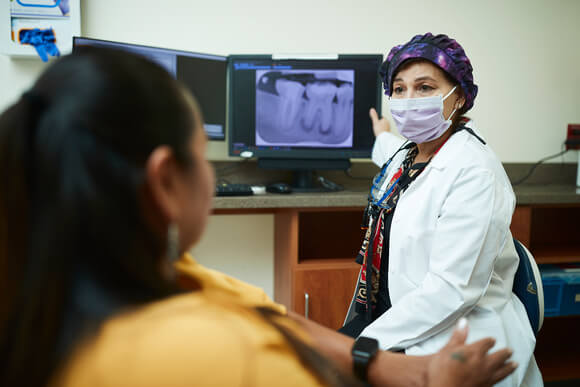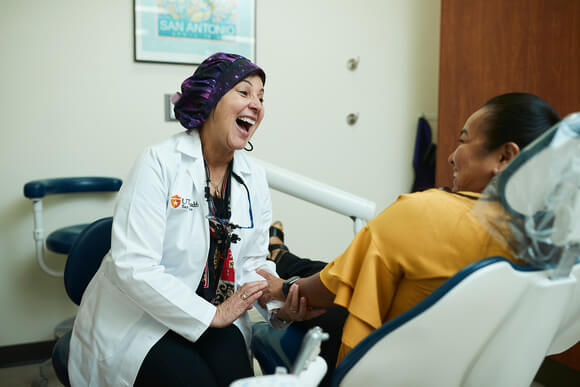Hormones. These chemical messengers hold the power to regulate mood, energy levels, sleep, appetite and libido — but changes in oral health, too?

“It’s true,” exclaimed Maiara Hister-Cockrell, DDS, an associate professor/clinical at The University of Texas Health Science Center at San Antonio School of Dentistry. “From puberty to menopause, a woman’s entire body, including [her] mouth, is impacted by the rise and fall of hormones,” she said.
The surge of growth and reproductive hormones that accompany certain life stages increase the flow of blood to multiple body sites including the gums. Hister-Cockrell said this increase of blood, estrogen and progesterone alters the response of gum tissue to bacteria that accumulate around teeth and under the gumline.
Later in life, when hormone levels fall significantly, it can affect saliva production, bone density, such as that of the jaw, or contribute to burning sensations in the mouth.
Navigating adolescence
“Let’s think about puberty,” Hister-Cockrell said. “The increase in hormones triggers puberty and also swells the gums, making them sensitive. They are easily irritated and prone to bleeding.”
While the gums are vulnerable, they are subject to infection by bacteria that live naturally in the mouth. Hister-Cockrell said a diligent oral hygiene routine is important to prevent early-stage gum disease known as gingivitis.
“Allowing bacteria to colonize around the teeth can lead to gingivitis and gingivitis can lead to periodontitis, tooth decay and worse, so it’s important to brush and floss every day to prevent this,” she said.
 The same surge of hormones and gum sensitivity occurs a few days before a menstrual period, Hister-Cockrell said. Canker sores are likely to appear as well but should quickly heal on their own once bleeding stops. Any noticeable swelling or sores in the mouth that do not subside afterward should be examined by a dentist.
The same surge of hormones and gum sensitivity occurs a few days before a menstrual period, Hister-Cockrell said. Canker sores are likely to appear as well but should quickly heal on their own once bleeding stops. Any noticeable swelling or sores in the mouth that do not subside afterward should be examined by a dentist.
Hister-Cockrell added that adolescence is a challenging life stage for dental health due to the social changes that occur alongside the physical ones.
“Parents have more control of what small children eat,” she said. “Teens and preteens are more exposed to carbonated drinks and fast food. It’s also during this stage that parents stop closely supervising nightly hygiene routines since they are considered old enough to manage on their own. But they are still developing, so more often than not, they don’t brush well enough or sometimes at all. This combination is not favorable for their teeth.”
Impacts of birth control and pregnancy
Individuals on birth control or who are pregnant find themselves on two sides of the same coin. For both, Hister-Cockrell said hormone levels look similar.
“Just like women who are pregnant, women who take contraceptives must watch their oral health,” she said. “This is because contraceptives mimic the state of pregnancy, so you have higher levels of progesterone and estrogen. This surge again makes women vulnerable to bacteria colonization and gingivitis.”
A hormonal contraceptive, such as the birth control pill, can also disrupt the healing process after a dental procedure depending on estrogen and progesterone levels. In a procedure such as a tooth extraction, a person on hormonal contraception is twice as likely to develop a painful condition called a dry socket. Most dentists suggest people on birth control schedule such a procedure during the last week of their menstrual cycle or during the “sugar pill” days when hormone levels are lowest.
 An expectant parent faces even greater oral health stress. Gingivitis is seen in 60% to 75% of pregnant individuals, suggesting that pregnancy is one of the roughest life stages for oral health. What’s worse, Hister-Cockrell said, is that many people stop seeing a dentist during their pregnancy.
An expectant parent faces even greater oral health stress. Gingivitis is seen in 60% to 75% of pregnant individuals, suggesting that pregnancy is one of the roughest life stages for oral health. What’s worse, Hister-Cockrell said, is that many people stop seeing a dentist during their pregnancy.
“Visualize it. You’re growing a baby, right? You’re seeing a doctor already. You’re uncomfortable and can’t sit for long, but it’s so important,” she said. “Some people even believe seeing a dentist while pregnant will hurt their baby, but gestational gingivitis is real.”
Seeing a dentist during the second trimester of pregnancy is vital for more than gum health, Hister-Cockrell said. The overall health of both parent and child could depend on it.
“Periodontal or gum disease is linked to preterm delivery and infants with low birth weight,” she said. And according to Hister-Cockrell’s review of the literature, “even preeclampsia can be associated with it.”
Pregnant individuals with gum infections are at 7.5 times higher risk for preterm delivery of low-birth-weight infants than those without infections. This is because the bacteria infecting the parent’s gums can travel through the bloodstream and pass through the placenta to the unborn child. Depending on when this occurs, the severity of the infection and the stage of the baby’s development, the consequences could range from low birth weight to miscarriage.
“The good thing is that this is all preventable under a dentist’s care,” Hister-Cockrell said.
Both the American Dental Association and The American College of Obstetricians and Gynecologists have stated that seeing a dentist during pregnancy is safe.
Vigilance during menopause
What remains unavoidable, despite recent advancements, is aging. Menopause typically occurs when women reach their 40s or 50s, a time when their ovaries significantly reduce the production of reproductive hormones. However, it can occur earlier due to a family history of premature menopause or other medical conditions.
As estrogen and progesterone decrease, a number of changes occur in the body. Menstruation becomes irregular and then stops, body temperature fluctuates and hair growth and sleep cycles change, but two changes in particular significantly affect a woman’s oral health, Hister-Cockrell said. Bone loss and dry mouth are common among menopausal women.
 “When you hear conversations about menopause, you usually hear discussion of osteoporosis,” she said. “This is because bone density decreases with the lower hormone levels and continues to do so after menopause.” Studies show that on average, women lose up to 10% of their bone mass in the first five years after menopause.
“When you hear conversations about menopause, you usually hear discussion of osteoporosis,” she said. “This is because bone density decreases with the lower hormone levels and continues to do so after menopause.” Studies show that on average, women lose up to 10% of their bone mass in the first five years after menopause.
“Why is this important for oral health? Because bone is part of a structure that holds our teeth in place,” Hister-Cockrell said. “If we start to lose the bone around our teeth, our gums may recede, the roots of our teeth stand to be exposed making them sensitive and unstable, prone to further bone and gum loss. Some people may notice that with age, their teeth begin to shift, this may be because of bone loss around the teeth making them less solid than when they were 20 years old.”
Dry mouth and burning mouth syndrome are also symptoms Hister-Cockrell sees in clinical patients at this life stage.
“Salivary glands are known to decrease their production of saliva in some women during menopause. This makes the mouth feel dry and can make chewing, swallowing and speaking difficult. Certain medications can also cause dry mouth,” she said.
She added that saliva is an important component to maintaining oral health, so its reduction needs to be monitored.
“Saliva helps to protect against tooth decay and infection due to its pH level,” she said. By helping to neutralize the pH in the mouth after eating or drinking, saliva defends against an acidic environment that would promote the breeding of harmful bacteria.
A burning or scalding sensation, known as burning mouth syndrome, can sometimes be linked to dry mouth. “It can come on quickly or over time and can cause tingling or numbness and change taste or bring on a metallic taste,” Hister-Cockrell said.
‘Dental care is health care’
At any life stage, Hister-Cockrell advises regular dental visits and a strong dental hygiene routine to maintain oral health.
“A dentist will help to identify an effective treatment plan for any of these conditions and can help a primary care doctor monitor a woman’s overall health. After all, the mouth is part of our body — dental care is health care,” she said.
For information on services provided by the dentists at UT Health San Antonio, visit UT Dentistry’s General Dentistry Clinic website or call 210-567-6453.


